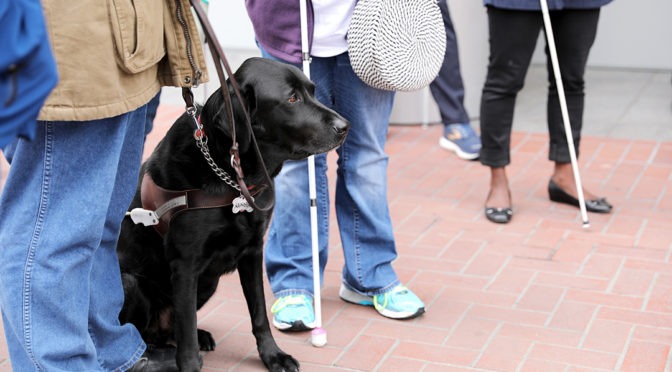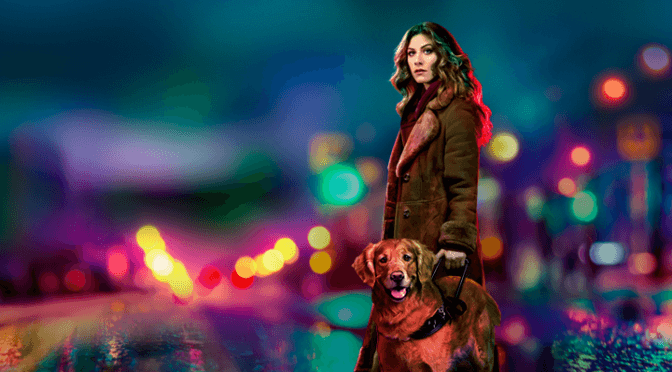This spring, the CW network launched a show titled “In The Dark” which focuses on a woman named Murphy who is blind. She has lived a rough life and made many questionable choices. Murphy’s life has narrowed down to a job she hates at a guide dog school her parents created for her, two friends she relies on—her roommate and a teenager—in order to function, and a reckless, partying lifestyle. So, when she stumbles upon a dead body she believes to her friend, Tyson, and the case does not receive the attention it deserves from the police, Murphy takes the investigation into her own hands.
Since before the first episode aired, critics who are sighted and blind have been speaking out about this series. Given its controversy, I thought the staff at LightHouse for the Blind in San Francisco might find it interesting to view the pilot episode together. Thirty of us gathered over lunch to watch it with audio description and closed captioning and then entered into a lively discussion about how the show affects the stereotypes of blindness both in a positive and negative light, and how it may shape our work at LightHouse.
In Hollywood, people who are blind are portrayed as one-dimensional in the entertainment industry; their lives are wrapped up in a pretty bow by the end of the story. This pattern is part of the appeal of the show. In the beginning, Murphy is far from likable. She has no drive and uses everyone in her life to her advantage without returning the favor, including her guide dog Pretzel. When she loses one cane, then her spare breaks, she finally gives in and calls her dog over to her to come work.
The writers have a unique way of addressing the stereotypes in a way that is humorous and actually educational without being patronizing. For example, on one of Murphy’s benders, she left a bar with a married man and when his wife came home early, the man told Murphy to hide. Murphy crawled away and found a table to crouch under but when the wife came in that room, she immediately saw Murphy. “This is a glass table, isn’t it?”, Murphy says before she is thrown out. This brought a chuckle to the room when we watched together. It’s a typical scenario in movies, yet anyone who is blind can relate. Thus it makes it alright for sighted people to laugh along with people who are blind.
There were some quirks we noticed as we watched. An accessible technology expert at LightHouse knows the tech vendor the show producers consulted about technology used by people who are blind. The cell phones used in the show make iPhone sounds but are Android phones. Another quirk is that the audio description does not mention that Murphy’s mom is white and her dad is black. It does come up in the episode that Murphy is adopted but we wondered if this is common for audio description to not mention race?
I am legally blind with limited sight, and this was one of the first times I have used audio description. I liked it, and found that I wanted all the information from audio description that a sighted person has, even if that might mean needing to pause the show while audio description catches us up.
The other issues we noticed revolved around the education of the writers in terms of blind travel and guide dog schools, or the lack thereof. Murphy’s sighted guide technique was terrible. It is hard to know whether that was due to her lack of wanting to be seen as blind or the writers’ lack of education? Also, Murphy seemed to use her cane and guide dog interchangeably. We discussed whether some of us do that as well, and asked each other when we use a dog versus a cane. Is one option preferable based on a situation, our mood or how we want to be perceived?
Ridiculously, Murphy’s parents opened up a guide dog school for Murphy. They thought it would be somewhere that she could thrive by working and being around other blind people. However, Murphy seems to despise the place. It is unclear whether that is due to her parents making her be there, that she doesn’t actually like the work and has other ideas for her life or that she wants to escape her blindness? Either way, I think we all can relate to people wanting to shelter us or swoop in and protect us at some point in our lives.
I originally watched the pilot episode in April to prepare to lead the discussion when the staff watched the episode together in May. It was hard not to go ahead and watch more episodes immediately! People have asked me if I liked the show. I’m not sure if “like” is the right word? It was intriguing, entertaining and thought-provoking. I will watch at least another episode or so to see how things develop. If the show becomes canned and predictable in its stereotypes, I will pass. I am left wondering, and will ask you as well, what is better: to have a white-washed version of blindness, or a nitty-gritty version of someone with ninety nine problems and blindness isn’t the first one?


